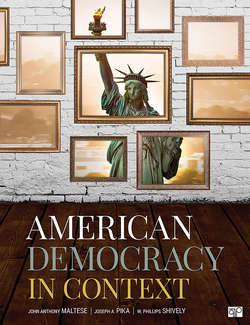Читать книгу American Democracy in Context - Joseph A. Pika - Страница 129
На сайте Литреса книга снята с продажи.
Perspective: How Much Government Control of the Internet Is Too Much—Or Too Little?
ОглавлениеThe Internet has transformed the way that people communicate. It has also vastly increased access to information—and disinformation. The use of social media such as Facebook to spread disinformation (“fake news”) during the 2016 presidential election has led to calls for government to regulate such platforms. But how would that square with the First Amendment and its guarantee that Congress shall make no law “abridging the freedom of speech, or of the press”? Would such regulation amount to government censorship?
Not all countries, of course, have qualms about censorship. China, for example, enacted a law in 2013 designed to curb “online rumors.” Under the law, those who post online rumors that are viewed by 5,000 or more Internet users or that are reposted more than 500 times can be arrested and jailed. In China, online rumors are broadly defined to encompass any socially destabilizing content (that is, pretty much anything the government wants to censor). In 2018, China launched a mobile app that allows the public to report such rumors.1
China has a long history of censoring and restricting access to the Internet. It has developed one of the most sophisticated Internet filtering systems in the world. E-mail, websites, blogs, chat rooms, and bulletin boards are all filtered for content by the government. Both Google and Yahoo! controversially agreed to alter their search engines in China in order to comply with government censorship, and the Chinese government blocked Facebook, Twitter, and YouTube in 2009 and cracked down on microblogs in 2011.2
At the time of the crackdown, China had a population of 1.3 billion, with roughly 485 million Internet users. The government requires Internet service providers (ISPs) to track precisely who is online and what sites users visit, and the government holds ISPs legally accountable if their users violate laws regulating Internet use. Likewise, the government requires Internet content providers (ICPs) to verify the identity of those logging onto their sites and to track their online activity. Failure to do so can lead to revocation of their business license and even arrest.
After signing up for Internet service, Chinese citizens are required to register with the local police within 30 days. Those using Internet cafés must present an identification card, which the café keeps on file for 60 days, along with a detailed log of each patron’s online activity. The café must cut off access to any patron who tries to access a forbidden website and must file a report with the government about such attempts. Forbidden websites have included Voice of America (a U.S. government-funded news radio service), foreign news outlets such as CNN and BBC News, and any site that deals with controversial topics ranging from Tibetan independence to democracy. Among the keywords that trigger filtering systems and block Internet access are revolution, equality, freedom, justice, Taiwan, Tibet, democracy, dissident, STD, and human rights.3
Many Westerners, including civil rights organizations, have criticized China’s censorship.4 But Chinese leaders have fought back, arguing that such criticism smacks of a double standard. Liu Zhengrong, deputy chief of the Internet Affairs Bureau in China, has pointed out that it is common practice around the world to remove “illegal and harmful” information from the Internet and claimed that China’s Internet regulations were no different.5
U.S. citizens do not have to register with the police when they sign up for Internet service, of course. Nor does the U.S. government filter content the way the Chinese government does. Although it is a crime to post or download child pornography, there is little content regulation beyond that. Should there be more? And to what extent should the government be able to monitor what you see and do online? As part of the Bush administration’s post–9/11 “War on Terror,” the U.S. National Security Agency monitored, without court order, e-mails, text messages, and phone conversations in which at least one party involved in the communication was believed to be outside the United States. With a court order, all Internet activity can be monitored by the government. Is that acceptable? The answer largely depends upon how one believes that liberty and national security should be balanced—an issue we will return to later in this chapter.
